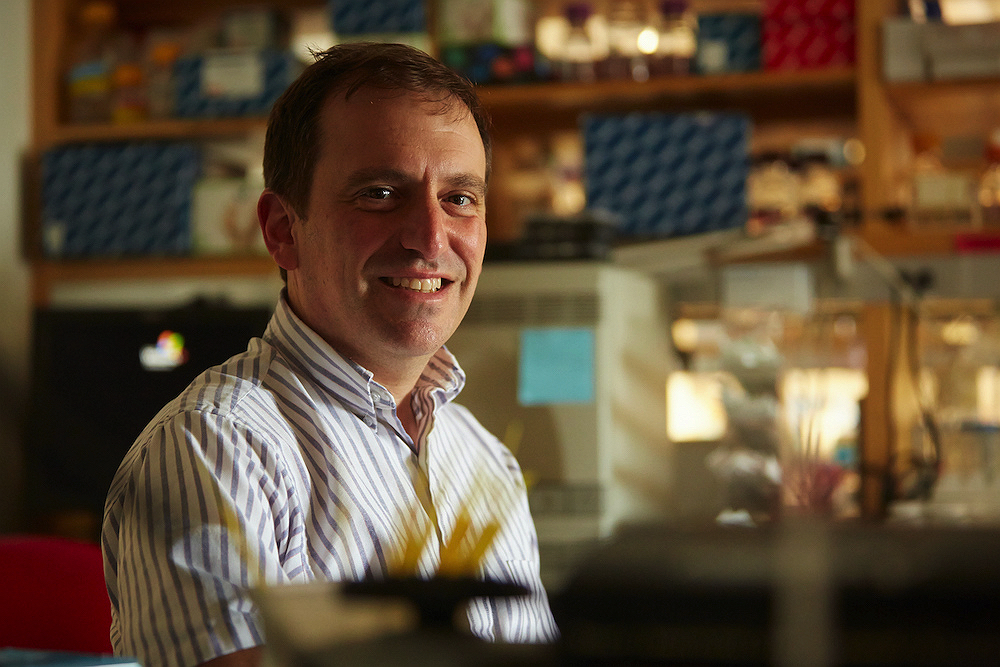Castle professor of medicine Dan Barouch, who runs Beth Israel Deaconess Medical Center’s (BIDMC) Center for Virology and Vaccine research, has been awarded $24.5 million during the next five years by the National Institutes of Health (NIH) to help find a cure for HIV. Barouch, whose global mosaic HIV-1 vaccine is currently in late stage clinical trials, is perhaps best known for his role in developing the single-shot, nonprofit Johnson & Johnson vaccine against COVID-19. He previously deployed his expertise in the use of adenoviruses to deliver vaccines—honed during decades of HIV-focused research—by developing the first Zika virus vaccine in 2016.
HIV infects approximately 37 million people worldwide, and is extremely difficult to cure. Antiretroviral therapy (ART) can control the virus, but not eradicate it. That’s because HIV integrates itself into infected individuals’ DNA, where it can lie dormant for decades. Within weeks after ART is withdrawn, a full-blown infection can recur, spawned from these latent reservoirs of disease.
Barouch’s NIH grant, one of 10 awarded to HIV researchers in 2021, will be used to study this viral reservoir, in order to develop new immunologic strategies for controlling or eradicating the infection.
Blumgart professor of medicine Mark Zeidel, head of BIDMC’s department of medicine, said that Barouch “has performed elegant, innovative science to enhance our understanding of HIV,” noting in a statement that “his innovations include the development of novel and highly effective adenoviral vectors, and the development and application of highly relevant animal models to test the efficacy of vaccine candidates. We look forward to seeing his future contributions in HIV research with this generous support.”
As reported in the current Harvard Magazine, Barouch remains deeply involved in the continuing efforts to combat COVID-19.

Marc Lipsitch
Photograph by Kent Dayton
As does professor of epidemiology Marc Lipsitch, who has been named one of four outside experts to plan and develop a new National Center for Forecasting and Outbreak Analytics that will aid the government in public-health decisionmaking. According to a Centers for Disease Control and Prevention (CDC) statement, the new center will perform “three key functions:
- Predict: Undertake modeling and forecasting; enhance the ability to determine the foundational data sources needed; support research and innovation in outbreak analytics and science for real-time action; and establish appropriate forecasting horizons.
- Connect: Expand broad capability for data sharing and integration; maximize interoperability with data standards and utilize open-source software and application programming interface capabilities, with existing and new data streams from the public health ecosystem and beyond.
- Inform: Translate and communicate forecasts; connect with key decision-makers across sectors including government, businesses, and non-profits, along with individuals with strong intergovernmental affairs and communication capacity for action.
Lipsitch, who will serve as director for science, said the new center will meet “a longstanding need for a national focal point to analyze data and forecast the trajectory of pandemics with the express goal of informing and improving decisions with the best available evidence.” He continued, “I am thrilled to be working with a great team at CDC to set it up, and excited to integrate the best and most innovative ideas from academia, the private sector, and government to make this a reality that will truly improve our response to future pandemics, and indeed to other infectious diseases.”
Earlier this year, Lipsitch was named to the scientific advisory board of the Coalition for Epidemic Preparedness Innovations, known as CEPI, a global partnership headquartered in Oslo, Norway. CEPI’s mission is to accelerate vaccine development to stop future epidemics; the organization has been a partner in the leadership of COVAX, the worldwide initiative that aims to provide equitable access to SARS-CoV-2 vaccines.









